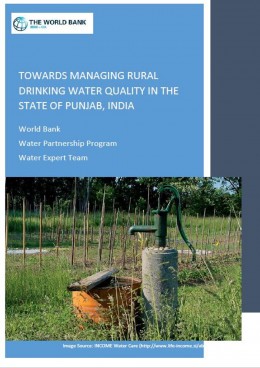RWSN Ressources

Author
World Bank
Year of Publishing
2017
Publisher
World Bank
Institution
World Bank
Towards managing rural water quality in the state of Punjab, India
Description:
The objective of this study was to systematically examine the drinking water quality issue, and provide practical guidance to the State of Punjab on possible responses.
While the study sought to provide an analytical basis for understanding the occurrence and impact of the contamination, practical actions were explored and demonstrated to allow the State to begin actively managing the water quality issue. The study is designed around three key areas:
1. Understanding the problem. The first is understanding the scope and scale of the problem, the reasons why pollution was appearing in the deeper aquifer where water supply tube wells are located, where the pollution coming from, and what were the attributable health impacts on the rural population.
2. Taking appropriate action. The second explores the actions that can be taken by the state to manage the water quality issue, by managing its water supply sources, ensuring that communities engage in safe water use behaviors, and continuously monitoring water quality to continue to understand the pollution characteristics and guide the ongoing management actions required.
3. Institutional sensitization and action. The third is around of the institutions that are responsible for water quality and its effects, their understanding of this emerging issue, and their ability to take coordinated action.
Bibliographical Information:
World Bank (2017) Towards managing rural water quality in the state of Punjab, India. , World Bank , World Bank
DOWNLOADS (53)
Towards managing rural water quality in the state of Punjab, India
 Google Übersetzer
Google Übersetzer
